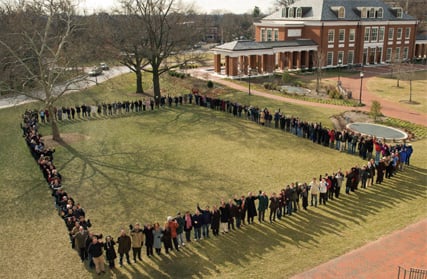 Dean Nicholas P. Jones surprised and thrilled the university community on January 3, when he announced a $30 million gift from alumnus John C. Malone that promises to usher in a new era of scientific investigation on the Homewood campus. “John has always been a visionary,” says Jones. “This allows us to move forward in new and exciting ways.”
Dean Nicholas P. Jones surprised and thrilled the university community on January 3, when he announced a $30 million gift from alumnus John C. Malone that promises to usher in a new era of scientific investigation on the Homewood campus. “John has always been a visionary,” says Jones. “This allows us to move forward in new and exciting ways.”
Malone, MS ’64, PhD ’67, is a major player in the global media landscape. A resident of Colorado, he chairs Liberty Media Corp., a holding company engaged in electronic retailing, media, communications, and entertainment. He also is chairman of Liberty Global Inc., a holding company that provides broadband distribution and video programming to subscribers in Europe, Latin America, and Australia.
His philanthropy enables the School of Engineering to proceed with construction of Malone Hall, a 56,000-square-foot research building that will house the Department of Computer Science and two major interdisciplinary efforts: a systems institute and an individualized health initiative. Construction is expected to begin in early 2012. The new facility will be located between Hackerman and Mason halls, on the Decker Quadrangle.
“Scientists from across Johns Hopkins will join together in Malone Hall, building on the foundation laid by the Whiting School’s engineers, mathematicians, and computational scientists,” says university President Ronald J. Daniels. “Together they will attack important problems from a variety of perspectives.”
Specifically, the Malone investment will establish:
A Systems Institute: Researchers from across the university will tackle problems in medicine, health care delivery, network enabled systems, information security, national infrastructure, and education. The effort will draw on the existing strength of Hopkins’ Applied Physics Laboratory, one of the nation’s leading centers of systems engineering.
A Homewood base for JHU’s Individualized Health Initiative: This effort includes engineers, life scientists, and medical researchers. Building on our understanding of genetic and epigenetic differences, they will focus on bringing information science more comprehensively into the practice of medicine, with an initial emphasis on cancer. The ultimate goal is to ensure that everyone receives adequate and appropriate health care.
The Malone gift also enabled the establishment of the John C. Malone Professorship to honor a faculty member who is a leader in transdisciplinary research. Russell H. Taylor, BES ’70, professor in the Department of Computer Science and founding director of the school’s NSF Engineering Research Center for Computer-Integrated Surgical Systems and Technology, is the first recipient. Taylor’s work in computer-integrated interventional medicine exemplifies this transdisciplinary research approach.




